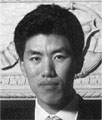


Producing commercial buildings that use 80 percent less energy than today’s buildings is a new target in the fight against global climate change. Berkeley Lab researchers — including Michael Sohn, Philip Haves, Michael Wetter, Mary Ann Piette, all with the Environmental Energy
Technologies Division — are developing technologies to help make this possible. The scientists are performing field testing and demonstration work of new technologies on the campus of the UC Merced (pictured), which has been designed to be a living laboratory, with sensors and instrumentation to support the development and demonstration of energy-efficient technologies and practices. More>
 Life as we know it started in the ocean, when primitive photosynthetic bacteria learned to split water into oxygen and hydrogen ions. The ocean puts oxygen into the atmosphere and takes carbon dioxide out. But how much longer can it continue to soak up what humans dump into the air? That depends on many factors. As important as liquid water are water’s gaseous and solid phases — clouds, snow, and ice. More>
Life as we know it started in the ocean, when primitive photosynthetic bacteria learned to split water into oxygen and hydrogen ions. The ocean puts oxygen into the atmosphere and takes carbon dioxide out. But how much longer can it continue to soak up what humans dump into the air? That depends on many factors. As important as liquid water are water’s gaseous and solid phases — clouds, snow, and ice. More>
As part of the Lab’s Emergency Preparedness Week acitivities, system developer Reed Hodgin will demonstrate the PolARES system — the latest development in crisis decision-making — on Tuesday June 9, at 1:30 p.m. in Perseverance Hall. PolARES is a field-portable, decision-support software system that combines relational-database technology with an artificial-intelligence engine. PolARES is readily adaptable in "plug and play" mode to multiple end-user groups, which makes it an ideal tool for an emergency operations center. More>
 People: Early Achievement Award for Life Scientist Jinyi Qi
People: Early Achievement Award for Life Scientist Jinyi Qi Jinyi Qi, a faculty scientist in Berkeley Lab's Life Sciences Division and associate professor of biomedical engineering at UC Davis, has been selected to receive the Early Achievement Award from the IEEE Nuclear and Plasma Sciences Society. The selection committee cited Qi for his contributions to computational nuclear medical imaging, particularly his work on statistically based, three-dimensional image reconstruction.
 The Global Biorenewables Research Society was launched May 20 by scientists from eight countries, aiming to become the independent standard for science-based knowledge for sustainable biorenewables. The founding members are international research leaders from diverse disciplines including agriculture, biology, economics and engineering. They will provide scientific assessments on environmental, social and economic challenges that increasing demand for biomass will bring. The Energy Biosciences Institute, of which Berkeley Lab is a partner, is a founding member of the organization. More>
The Global Biorenewables Research Society was launched May 20 by scientists from eight countries, aiming to become the independent standard for science-based knowledge for sustainable biorenewables. The founding members are international research leaders from diverse disciplines including agriculture, biology, economics and engineering. They will provide scientific assessments on environmental, social and economic challenges that increasing demand for biomass will bring. The Energy Biosciences Institute, of which Berkeley Lab is a partner, is a founding member of the organization. More>
A memorial service for Berkeley Lab chemical scientist Pat Durbin, who passed away at age 81 on March 5, will be held on Saturday, August 15, at 11 a.m. in the Brazil Room at Tilden Park. Those interested in attending are asked to contact Catherine Mendez (x5587).
Today at Berkeley Lab is produced by Public Affairs' Communications Department